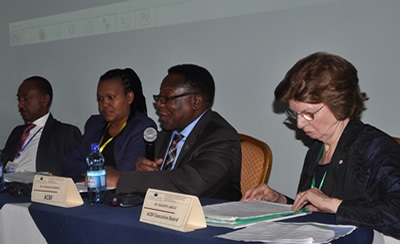
Political support and people’s buy-in of capacity development initiatives in domestic resource mobilization is crucial for successful fiscal reforms, which can lead to Africa being able to finance its own development, said Prof. Emmanuel Nnadozie, the Executive Secretary of the African Capacity Building Foundation (ACBF) during a panel discussion held today by the Foundation in Addis Ababa, Ethiopia.
The discussion, themed “Building Capacity for Domestic Resource Mobilization to achieve the Sustainable Development Goals” saw the participation of representatives from the World Bank, African Development Bank, United Nations, African Union Commission, Regional Economic Communities, Think-tanks, Governments offices, Civil Society Organizations, and Non-Governmental Organizations among others.
Early findings from case studies being undertaken by the ACBF show that the level of tax collection in Africa increases significantly after the setting up of national revenue authorities, which are tasked with professionalizing, expediting and improving efficiency in tax administration in the countries where they operate.
Case studies show, however, that despite some countries being better than others in terms of capacity to mobilize resources, some African countries either do not have enough staff or are not able to retain them. Others lack the administrative capacity and human resources - not only in terms of man power but also in terms of skills – needed to mobilize resources or track illicit financial flows.
“A growing demand for tax specialists amongst the natural resources sector, financial institutions and consultancy firms, which are able to offer much more than what national revenue institutions are able to offer, is a challenge for the retention of staff,” said Prof. Nnadozie. “On the other hand, the lack of financial analysts and specialists in cybercrimes is a challenge for institutions fighting illicit financial flows.”
Prof. Nnadozie added that there was a need to develop capacity in mobilizing savings on the continent, improving on collection of tax revenue through more efficient tax systems and broadening of the tax base, and arresting illicit financial flows.
This will be achieved if priority is given to the strengthening of tax policy and improvement of the tax administration’s capacity; the instituting of a system of checks and balances to ensure that the tax administration follows established legal and procedural frameworks uniformly across tax payers; the strengthening and institutionalizing of risk management; the adoption of effective audit programs and ensuring high level of accountability, founded on sound governance and management of structures and processes.
The panel discussion brought fourth capacity imperatives for DRM and highlighted other strategies that are efficient, effective and innovative, based on country experience.
Among the panelists were also Dr. Huguette Labelle, Chair of the Audit and Risk Committee of the Executive Board of ACBF, Ms. Mmakgoshi Phetla-Lekhethe, Deputy Director General: International and Regional Economic Policy, National Treasury – Republic of South Africa, Gabriel Negatu, Regional Director, Eastern Africa Regional Center, African Development Bank, Dr. Ayodele Odusola, Chief Economist and Head Strategy and Analyses Team – UNDP Regional Bureau for Africa, and Mr. Ashwajit Singh, Chairman and Director, IPE Global.





